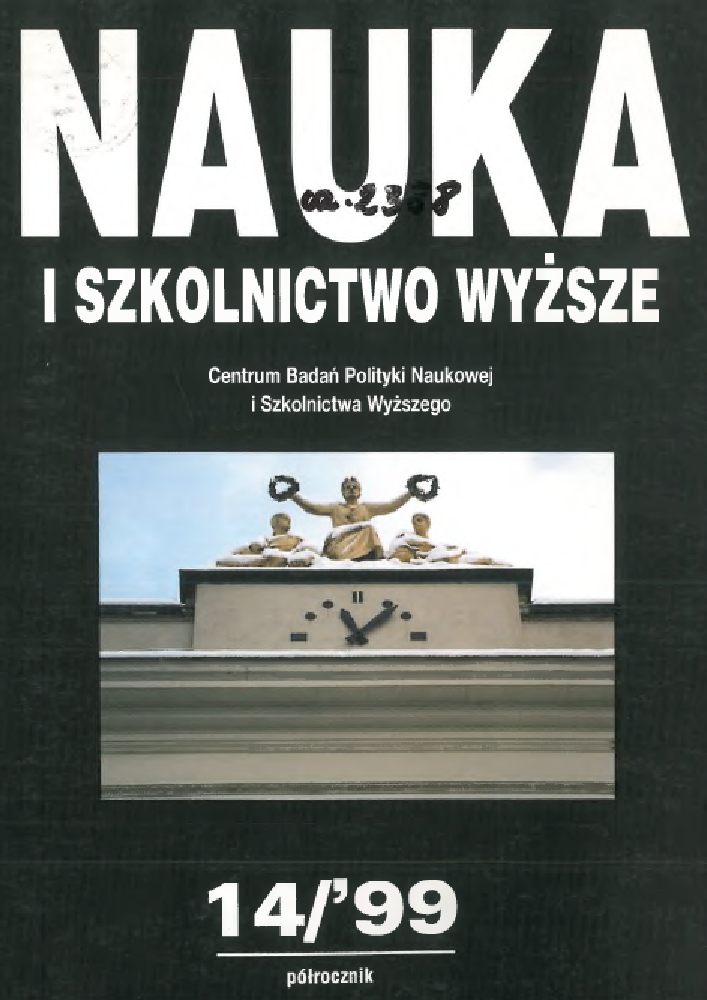Abstract
The growth of various forms of education shows on the one hand that education and money spent on it are treated as indispensable investments that increase an individual’ s opportunities on the job market. On the other hand, it shows that the higher education system is trying to answer the demands of the working economy. Various studies conducted at universities throughout the world have been trying to answer the question whether investment in higher education is really a passport to a good career, and whether qualifications obtained during the course of education are in line with market expectations and whether they lead to Professional success. These studies analyse opinions expressed by students, graduates and employers regarding the quality of services offered by schools, and about the levels of knowledge and skill that universities are expected to provide. When contrasted with the existing situation in these areas, they show the directions of needed program modifications and the necessity of improvements to the quality of education. The analysis presented may be seen as part of this body of research. It was aimed at measuring the professional advantage of completing the “Firm Management” post-graduate course offered by the Nowy Sącz Business College in cooperation with National Louis University, and to gather information on needed improvements to the course. It was also intended to identify students’ motives for participating in the course.
References
Bielecki P. 1998 Rynek pracy a zmiana struktur kształcenia w szkolnictwie wyższym (przykład ekonomii i zarządzania - doświadczenia brytyjskie), w: Studia wyższe - szansa na sukces?, Instytut Spraw Publicznych, Warszawa.
Darska A. 1996 Doświadczenia europejskie związane z badaniem relacji między kształceniem a zatrudnieniem, „Nauka i Szkolnictwo Wyższe”, nr 7.
Miciński A. 1999 Oczekiwania współczesnego biznesu wobec umiejętności absolwentów wyższych uczelni, referat wygłoszony na ogólnopolskiej konferencji „Wyzwania Unii Europejskiej dla postaw, umiejętności i wiedzy przyszłych menedżerów”, zorganizowanej przez Fundację Edukacyjną Przedsiębiorczości, Łódź, 5-6 listopada 1999.
Minkiewicz B., Osterczuk A. 1997 Rozwój szkół biznesu - główne tendencje, w: Zmiany w kształceniu w zakresie zarządzania i biznesu w Polsce w latach 1993-1995, Biuro Koordynacji Kształcenia Kadr, Warszawa.
Minkiewicz B., Osterczuk-Kozińska A. 1998 Studia a kariera zawodowa - absolwenci na rynku pracy, w: Studia wyższe - szansa na sukces?, Instytut Spraw Publicznych, Warszawa.
Minkiewicz B., Osterczuk-Kozińska A. 1999 Zmiany na rynku edukacji menedżerów w latach 1994-1998 - główne tendencje, w: Zmiany w kształceniu w zakresie zarządzania w Polsce w drugiej połowie lat dziewięćdziesiątych, Biuro Koordynacji Kształcenia Kadr, Warszawa.
Pawłowski K. 1999 a Współpraca między uczelniami a otoczeniem biznesu jako warunek tworzenia kapitału intelektualnego, referat wygłoszony na ogólnopolskiej konferencji „Wyzwania Unii Europejskiej dla postaw, umiejętności i wiedzy przyszłych menedżerów”, zorganizowanej przez Fundację Edukacyjną Przedsiębiorczości, Łódź, 5-6 listopada 1999.
Pawłowski K. 1999 b Wyższe szkolnictwo niepaństwowe w Polsce po 1990 r., w: Stan rozwoju niepaństwowych szkół wyższych w Polsce, Polskie Forum Akademicko-Gospodarcze, Jelenia Góra, 16-18 kwietnia 1999.
